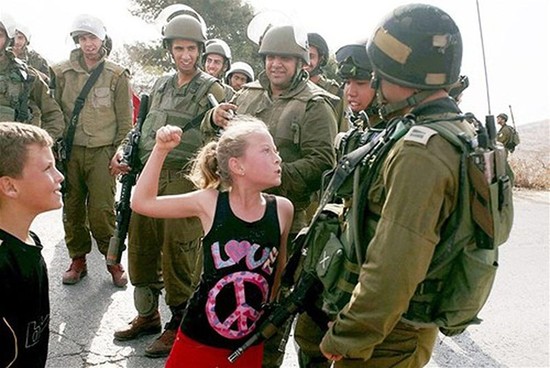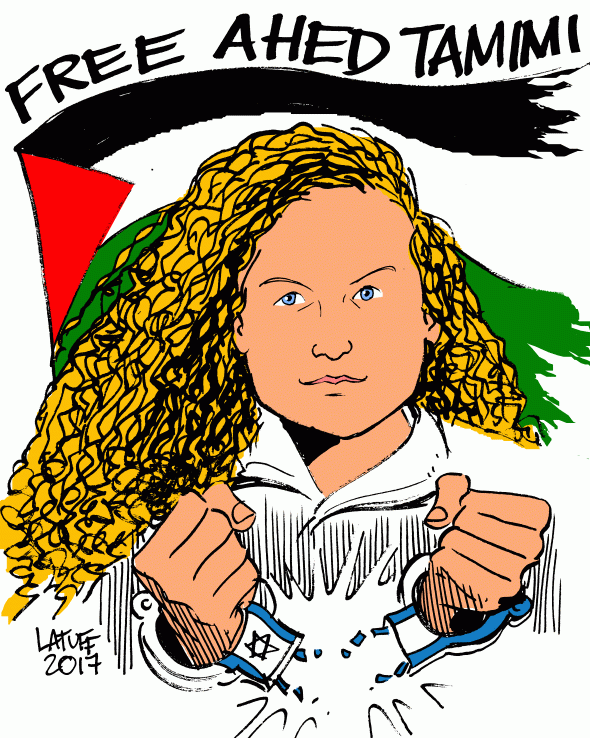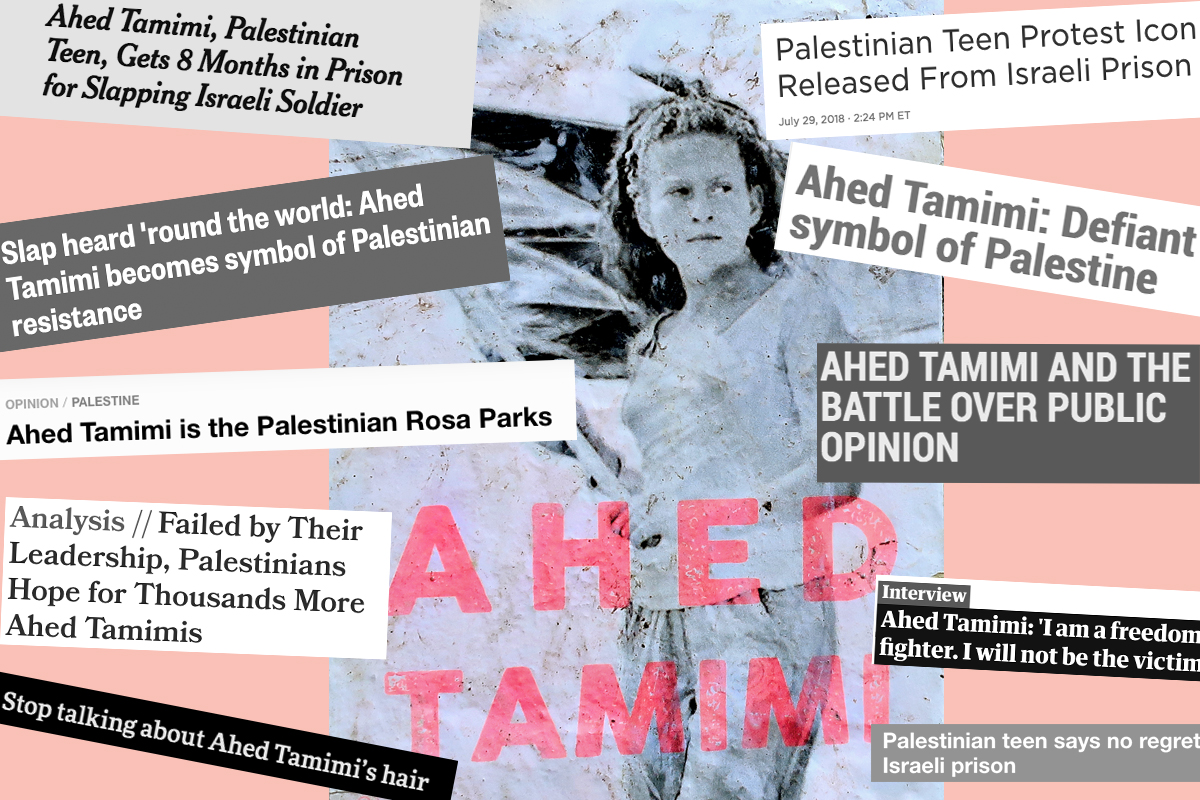You’ve probably seen the name Ahed Tamimi, but maybe not. You may have even seen her curly blonde hair and blue eyes, watched the confrontation with Israeli soldiers, and read the countless articles written about her.
Maybe this is your first time reading of her. Ahed Tamini is 17 years old, a Palestinian activist who just served 8 months in Israeli prisons for assaulting an Israeli soldier, and has become the viral face of Palestinian resistance. For many Israelis and pro-Israel supporters, she represents something more nefarious: the “weaponization of Palestinian children” by their parents.
We’re here to explain Ahed Tamimi’s story and impact.
Who is Ahed Tamimi?
Ahed Tamimi, 17, is a Palestinian activist from Nabi Saleh, a Palestinian village in the West Bank that’s about 12 miles northwest of Ramallah. Born January 31, 2001, near the start of the Second Intifada, Tamimi’s family is known for their anti-occupation activism. (Interesting side fact, according to the New York Times, as of 2013, all of Nabi Saleh’s 550 residents are related by blood or marriage, and nearly all have the last name Tamimi.)
In 2012, when Ahed was just 11, a photo of her wearing a tank top with a peace sign and shaking her fist at an Israeli soldier went viral. She was even flown to Istanbul to receive the “Handala Courage Award.” In Istanbul, Ahed and her mother were treated “like heroes” and “greeted at the airport by dozens of children wearing T-shirts printed with Ahed’s photo. They drove past billboards displaying Ahed’s image. Reporters followed them everywhere. Crowds gathered when they walked in the streets.”

Ahed’s father, Bassem Tamimi, organizes weekly demonstrations every Friday in Nabi Saleh against Israeli settlements (and has done so for almost 10 years). Bassem is an outspoken activist; he was arrested in March 2011 following a demonstration and charged with “dispatching stone-throwers and protesting illegally.” Amnesty International called him a “prisoner of conscience,” which means a prisoner who has been imprisoned for political beliefs, not breaking the law. As of 2015, Bassem has been arrested nine times.
In a 2013 New York Times Magazine article by Ben Ehrenreich, “Is This Where the Third Intifada Will Start?”, Bassem and the Tamimi family are the focus. The author writes of their social media expertise (their blog, YouTube channel, Twitter presence, and more), and of Bassem’s commitment to popular resistance. (The 8,000-word article is worth a read to understand the Tamimi family.)
In 2015, Ahed’s younger cousin, Mohammed Tamimi, was the subject of a viral video filmed in Nabi Saleh. He was 12. As The Times of Israel reported, “In the video, a soldier is shown forcefully restraining Mohammed Tamimi, whose arm was in a cast, placing him in a chokehold and pressing his head against a boulder. Moments later, a group of Palestinian women, led by Tamimi’s 15-year-old daughter Ahed, began grappling with the soldier and punching him until a commander arrived and extricated him from the fracas.” You can watch it here.
In a 2011 interview with the deeply pro-Palestinian site the Electronic Intifada, Bassem said, “our destiny is to resist,” thus becoming a slogan for the Tamimi family, and the title of many of Bassem’s talks in the U.S. (In 2015, Bassem went on a speaking tour to advocate for the Boycott, Divest, Sanction Movement, organized by Jewish Voice for Peace.)
In July 2018, a Haaretz article referred to Ahed Tamimi and her family as “Israel’s Ongoing PR Disaster.”
What happened in December 2017?
On December 15, 2017, Ahed was with her 20-year-old cousin, Nur Tamimi. On a video, Ahed is seen yelling at heavily armed Israeli soldiers, pushing and kicking them at the entrance of her family home. Her mom, Nariman, enters the video, tries to calm things down. This occurred soon after Ahed’s 15-year-old cousin was allegedly shot in the head by a rubber bullet, and put into a medically induced coma.
The video went viral:
בסרטון שמופץ בשעות האחרונות וצולם ביום שישי בנבי סלאח נראות פלסטיניות דוחפות, בועטות ומנסות לסטור לחיילים, שנמנעים מלהגיב @inbaltamir pic.twitter.com/oE3qsvbDuB
— כאן חדשות (@kann_news) December 18, 2017
(The tweet, translated, reads: “In a video that has been distributed in the last few hours and filmed on Friday in Nabi Salih, Palestinian women are seen pushing, kicking and trying to slap soldiers who refrain from responding.”) (On Facebook, the video has over 3 million views.)
In the video, “she calls on Palestinians to stab and throw rocks at Israelis, and offer themselves as suicide bombers in order to ‘liberate Palestine'”
This wasn’t her first confrontation of Israeli soldiers (note: the 2012 photo, or the 2015 video), but it led to her arrest. On December 19, Ahed is arrested.
#FreeAhedTamimi
Soon after her arrest, the hashtag #FreeAhedTamimi (and #FreeTamimiFamily) began trending.
Urge Israel to #FreeAhedTamimi. For years, she and her family have bravely stood up against the Israeli occupation. Now she’s spending 8 months in prison. @netanyahu must release her now. Take action 👉 https://t.co/95inhBPiHy pic.twitter.com/s59F6jZlGL
— Amnesty UK (@AmnestyUK) March 26, 2018
Her likeness — curly blonde hair, fair skin — began popping up everywhere.
Salutes to Ahed Tamimi on her 17th birthday, awaiting trial in an Israeli military prison. #FreeAhedTamimi pic.twitter.com/AzXMP4wgVU
— Haymarket Books (@haymarketbooks) January 31, 2018
As the world celebrates #WomensDay , 16 y/o palestinian girl ahed tamimi & many others like her still remain illegally imprisoned in israeli prisons. They deserve a free life with universal human rights as we do. #GroupPalestine #FreeAhedTamimi pic.twitter.com/M9TteOZ3y5
— !₹ (@D_Hturt) March 8, 2018
Today, Ahed Tamimi turns 17. She will be spending her birthday in Israeli captivity for defending her village, family, and people from Israeli colonial encroachment. #FreeAhedTamimi and the hundreds of Palestinian children in Israeli detainment! pic.twitter.com/SYWW9vrRpz
— Andrew (@masridrew) January 31, 2018
Bassem, in an opinion article in Haaretz, wrote, “My daughter is just 16 years old. In another world, in your world, her life would look completely different. In our world, Ahed is a representative of a new generation of our people, of young freedom fighters.”
Ahed with her father, Bassem Tamimi! #NabiSaleh pic.twitter.com/MvE9RTAvOX
— Mariam Barghouti مريم البرغوثي (@MariamBarghouti) July 29, 2018
A spokesperson for the Israeli army said the incident showed the soldiers “acted professionally and were not dragged into violence.” Thus the virality: the video was shared by both pro-Israel and pro-Palestinian activists. As Yasmeen Serhan writes in The Atlantic in January 2018, “For Israelis, she is seen as living proof of the army’s restraint. For Palestinians, she appears to have emerged as a national hero representing of a new generation of Palestinian resistance. A young girl known for her long, curly hair isn’t the image one might typically come to expect of a national freedom fighter… Unlike these leaders from generations past, Ahed is both young and very much online—recognizable not only to those within Israel and Palestine, but to viewers around the world.”
On January 1, 2018, an Israeli military court charged Ahed with 12 counts, including “aggravated assault, hindering a soldier in the line of duty, incitement, threatening a soldier’s life and rock throwing.” The indictment covered six different incidents in which she got into altercations with Israeli soldiers, including the Dec. 15, 2017 incident that was captured on video. On January 17, she was denied bail. #NoBirthdayBehindBars, an effort organized by IfNotNow to free her before her 17th birthday, picked up traction online. (It failed.)
On March 14, she took a plea deal — pleading guilty to four counts of assault — and was sentenced to spend eight months in prison. On July 29, 2018, Ahed was released from prison and returned home. Upon her release, she said “the resistance will continue until the end of the occupation,” and met with Palestinian President Mahmoud Abbas.
This is the moment Ahed Tamimi walked free.
But 100s of Palestinian children remain locked up, despite many having committed no recognisable crime. Israel must stop discriminating against Palestinian children. pic.twitter.com/wteeqhEufR
— Amnesty UK (@AmnestyUK) July 30, 2018
She said, upon her release, “In the end, I want to say that the power is with the people, and the people will and can decide their destiny and decide the future. Women are a key part of the Palestinian struggle for freedom, and the women’s role will continue to expand, not only in the struggle but by producing new generations that can continue the struggle. We say: ‘Leave, leave occupation.'”
Ahed Tamini’s Image
The way Ahed looks hasn’t gone without notice. As journalist Ben Ehrenreich put it (he’s the author of that very good and very long profile of the Tamimi family), “Unavoidably, she is blonde and light-skinned and light-eyed. A great deal of work goes into ‘othering’ Palestinians, to casting them as some really recognizable other… but when suddenly the kid doesn’t fit into those stereotypes—when she actually looks like a European kid or an American kid—then suddenly all that work of dehumanization can’t function, and she can’t be ‘othered’ in the same way. And then people freak out.”
In a post on medium, a writer dives into the debate surrounding Ahed Tamimi’s blonde hair. He writes, “What many of those debating this don’t want to admit is that Palestinian and Israeli society are both diverse. They are so diverse that they are often not distinguishable. Yet both societies have used identity politics to assert concepts of indigeneity based on appearance…Being blond [sic] doesn’t make one look more Israeli. It doesn’t make someone more or less indigenous. There is an obsession with looks, particularly when it comes to women. Tamimi has become a symbol of that toxic debate.”

Ahed’s father Bassem told journalists, “If she was veiled and dark-skinned, would she have got the same attention?…The Zionist propaganda machine always depicts the Palestinian as dark-skinned and ugly, attacking the blonde victim, but now she is blonde.”
Perhaps Ahed’s looks contributed to the spread of her image. As one blogger writes on mvslim.com, “One of the things that personally struck me in the last weeks of media coverage, is how frequently Ahed’s blonde hair is described in the news coverage of her arrest. I am yet to find one article in which her appearance is not mentioned… Ahed’s blond hair has been used against her by anyone who thinks she did not deserve the attention.”
Reactions to Ahed Tamimi
Ahed has been called the “Palestinian Rosa Parks,” a “Teen Protest Icon,” “the new face of Palestinian resistance,” “Palestine’s icon,” and more. She’s been portrayed as Wonder Woman, by the artist who made the famous Che Guevara painting:
Yet, many pro-Israel writers write of “the weaponization of Palestinian Arab children by their own society, even by their own families,” particularly Ahed and her family.
As one journalist writes in the New York Times, “To supporters, Ms. Tamimi is a courageous, consciousness-raising icon of popular Palestinian resistance. Pro-Israeli detractors view her and her family as publicity-seeking agitators who exploit children by putting them at the forefront of the struggle and as experts in what they say are staged provocations they call ‘Pallywood.'” (Pallywood = Palestine + Hollywood, coined by Richard Landes to “describe media manipulation, distortion or fraud by some Palestinians putatively designed to win the public relations war with Israel.”)
In Israeli media, she’s been called “Shirley Temper” (see examples here). As Ruth Eglash wrote in the Washington Post, “They, like the Israeli police, say her actions are staged and a clear attempt to create a negative image of Israel.” That she intended to provoke the soldiers, and failed.
When Sarah Silverman tweeted about Ahed Tamimi back in February 2018, she received backlash from pro-Israel activists. As JTA reported, among those who responded to Silverman’s tweet about Ahed, were Frimet and Arnold Roth, whose 15-year-old daughter was killed in August 2001. They tweeted from the handle @ThisOngoingWar, saying, “Entertainers exploiting their fame are often a poor choice for clarifying what’s moral or good. Sarah, did you stand up for our daughter Malki and the other 15 Jewish lives extinguished by Ahlam Tamimi, Ahed’s cousin and role-model-in-life? Do you stand with Ahed’s call to kill?”
StandWithUs, a pro-Israel advocacy group, shared this video, lamenting that she is called a face of “non-violent resistance”:
These activists focus in on the advocacy for violence by members of Ahed Tamimi’s family, and the purported anti-Semitism that Bassem Tamimi spreads (including blood libel and Jews-control-the-media theories). As one op-ed puts it, “Ahed Tamimi and her family aren’t fighting for peace, and they’re not just fighting the occupation: They’re fighting to destroy Israel, and their fight is seasoned with Jew-hatred.”
What now?
Israel faces heightened scrutiny over Ahed’s arrest, with organizations like Amnesty International calling for the release of “hundreds of Palestinian children” who remain in prison.
Ahed’s next plans are to study law, so she can sue Israel in international courts for war crimes. She said, “Of course I’m not going to forget the cause, but I’m going to invest in my studies, because knowledge is the strongest weapon for a struggler.”
Ahed Tamimi will undoubtedly remain a prominent Palestinian activist.



